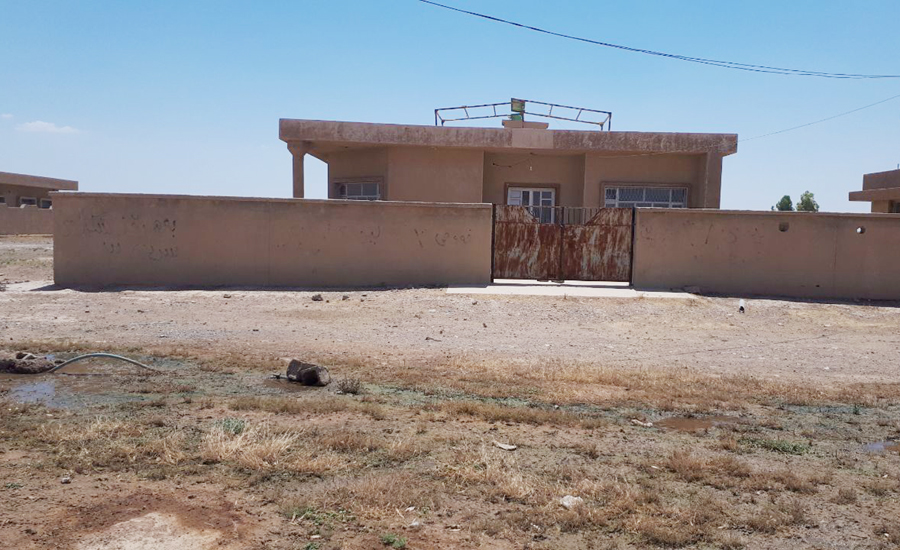A health center that provided healthcare to five villages on the border between the two districts of Kafri and Tuzkhurmatu in the disputed territories has been completely shut for nearly 10 years, forcing villagers to drive to the nearby towns for treatment.
In 2005, the Kurdistan Regional Government (KRG) opened a health center in Qumpalk village of Znana subdistrict of Tuzkhurmatu district, of Salahaddin province. The village is administratively under the Garmian administration, but since 2013 it has been closed by the Garmian Health Directorate.
“The opening of the center was very important for us. It was open day and night. People from four other villages (also) were receiving treatment at the same center,” said Halkawt Mohammed, a resident of the village,
They closed the center where people from five villages were receiving treatment
The center was opened in 2005. The village had 50 families at the time. Currently, only 15 families reside the village and the others have evacuated. Four other villages with dozens of families received treatment at the health center.
The village is located in the disputed its administration has not yet been resolved between the central government and the KRG according to the article 140 of the Iraqi constitution which has drawn a 3-step roadmap of normalization, census and elections.
“Now we have to go to the city hospitals for a headache or a flu,” Halkawt Mohammed said.
The multi-ethnic district of Tuz Khurmatu, home to 130,000 Turkmens, Kurds and Arabs, located 70 kilometers south of Kirkuk and part of Salahaddin province, is the only disputed town of the province and one of the disputed territories between Erbil and Baghdad.
The predominantly Sunni-Muslim Arab province of Salahaddin, about 135 kilometers north of the Iraqi capital, once home for Saddam Hussein, is under the control of Iraq's Shia-led paramilitary forces known as al-Hashid al-Shabi, the Popular Mobilization Forces PMF.
We have to go to the city hospitals for a headache or a flu
According to the local residents, the center had provided satisfying medical services as it was equipped with medical supplies, doctors and health workers and was open to the villagers 24 hours a day.
“We have taken patients to Tuzkhurmatu several times in the middle of the night when the area is not safe,” Mohammed added. “These days we have taken an emergency patient to Tuzkhurmatu though the road is not safe and far.”
The drive to Tuzkhurmatu is about half an hour by car.
"We demand the doors of the health center to be opened to the citizens again," Mohammed called on the local administration.
"Between 2010 and 2014, three health centers were closed in the villages, including Qumpalk village. One of the reasons for the closure was that there were few houses," said Abbas Aziz, deputy director general of health in Garmian.
However, he stressed that several other villages were receiving treatment there.
"There is a lack of staff in the health sector. We don't have enough staff for these centers," Aziz said.
Iraq’s healthcare system which was once one of the most advanced in the region now is in serious crisis. There’s a shortage of drugs and the medical staff to administer it. Over the past three decades the country has been ravaged by Iraqi-Iran war, Saddam Hussein’s invasion of Kuwait, ousting of Saddam regime followed by sectarian violence, the war against al-Qaeda and the rise of Islamic State in Iraq and Syria ISIS.
The political chaos after 2003, pushed an estimated 15,000 out of 52,000 registered Iraqi doctors to leave the country. The young student doctors primarily seek training and life abroad rather than permanent state employment.
We don't have enough staff for these centers
"One of the biggest health problems in Sulaymaniyah province is the lack of health workers," said Hawzhin Osman, president of the Sulaymaniyah branch of the Kurdistan Health Workers’ Union, in an open discussion organized by Internews and KirkukNow.
"There are 12,000 medical post-graduates in Sulaymaniyah province the Kurdistan Regional Government has not employed them, while we need people in all health units,” Osman added.
"Since the center was closed, the villagers have not come to request the opening," deputy director general of health in Garmian said.
Mohammed Khurshid, the council of Qumpalk village, said, "We need the center more than ever, there is a coronavirus epidemic and hemorrhagic fever has spread, we ask both the central and Kurdistan Regional Governments to think about opening the center.”
Viral hemorrhagic fevers VHF are infectious diseases that can cause severe, life-threatening illness. They can damage the walls of tiny blood vessels, making them leak, and can hamper the blood's ability to clot. The resulting internal bleeding is usually not life-threatening, but the diseases can be, according to Mayo Clinic.
Signs and symptoms of VHF vary by disease. In general, early signs and symptoms can include fever, fatigue, weakness, dizziness, muscle and or joint ache, nausea, vomiting, and diarrhea.
Iraq has recorded tens of positive cases and deaths in 2022. The Iraqi government said it is taking precautions to curb the spread of the infection.
"The area belongs to the Kurdistan Regional Government and they must open the base for them," said Kamil Jamil, director of Duzkhurmatu hospital.
Abbas Aziz, deputy director general of health in Garmian, asked the villagers to raise the demand through a letter from the village council.
"These people deserve to have their base opened, and it is very necessary to have it.”





